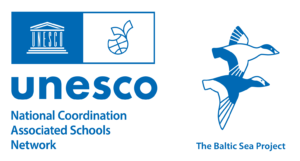The Baltic Sea Project
The Baltic Sea Project within the UNESCO Associated Schools Network aims to bring together teachers and students from the Baltic Sea countries to work towards a common goal: to raise the environmental awareness of future generations, to support environmentally friendly attitudes and to teach young people the skills to notice and explore changes in their environment.
Network overview
UNESCO Associated Schools Network was established in 1953 to support international understanding, peace, intercultural dialogue, sustainable development, and quality educational practices. The network already consists of about 11,500 educational institutions around the world. Through activities, joint schools contribute to a better and more sustainable world, carry out innovative pilot projects and understand the importance of four learning objectives in education: learning to know, to do, to be and to live together.
The Baltic Sea Project – BSP, a pilot project of the UNESCO Associated Schools Network, is an environmental program for schools in the Baltic Sea countries, involving a total of 200 schools from different countries. Estonia joined the project in 1992. The aim of the Baltic Sea Project is to increase students’ awareness of the environmental problems of the Baltic Sea and the interdependence between man and nature, to develop students’ ability to notice environmental changes and to guide students to behave more sustainably.
In Estonia, the UNESCO Associated Schools Network works hand in hand with the Baltic Sea Project programs. The Network’s activities are based on the UN’s Sustainable Development Goals and Climate Change and cover the areas of Environmental Education, Global Education, Sustainable Development Education, Global Citizenship Education, and Human Rights Education. The schools that have joined the network are free to choose whether to focus on environmental education or global education or to try to integrate them.
There are over 60 educational institutions in Estonia that have joined the network. The list of Estonian UNESCO joint schools can be viewed here. In particular, the emphasis in the network is on improving the quality of education, not on increasing the number of members of the network. Joining the network has been made as easy as possible for schools – a guide material for schools has been compiled, which briefly explains everything important about being a member of the network.
The main aim of school activities is to link environmental and societal issues and to understand different concerns in a local, regional and global context. Attention is paid to students’ active participation, taking responsibility and understanding that there is something unified and binding in being human, that different parts of the world and people are in constant interaction in today’s globalizing world.
Coordinating
The world educational activities of UNESCO Associated Schools in Estonia are coordinated by MTÜ Mondo from Tallinn and the environmental education activities of the Baltic Sea Project are coordinated by Tartu Nature House.
The Estonian National Commission for UNESCO Foundation advises on the national coordination of the network and promotes co-operation with state agencies, other networks, and local and international organizations. The activities of the network are supported by the Ministry of Education and Research, the Ministry of the Environment (through the EIC) and the Ministry of Foreign Affairs.
Joining and activities
You can join the network at any time. To join or for more information, contact the Estonian national coordinators:
MTÜ Mondo: Meelike Terasmaa, unescoschools@mondo.org.ee
Tartu Nature House: Maria Ivanova, maria.ivanova@tartuloodusmaja.ee
Additional information:
Before sending the application for membership, we ask the heads of the institution and the contact person of the school to read the network guide material.
There are no major requirements for members, but once a year the school contact person is asked to fill in a report form, which is sent to the school by the national coordinator in June. To remain on the list of active members, the school must celebrate two UN international anniversaries during the school year, inform the community about the network’s activities and participate in at least one of the activities offered during the school year.
Information about the events will be sent to the school’s contact person’s e-mail address. In addition, it is possible to follow the calendar of events and join the closed Facebook group “UNESCO Associated Schools in Estonia”.
Find out more about the project activities and partial impressions in the collection of successes and failures of the UNESCO joint school network in 2018-2019.
